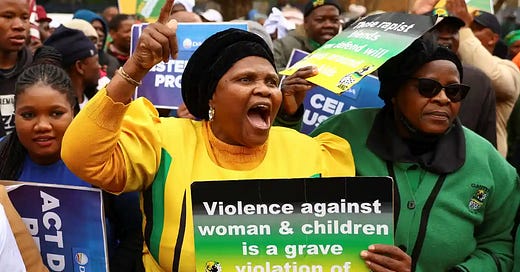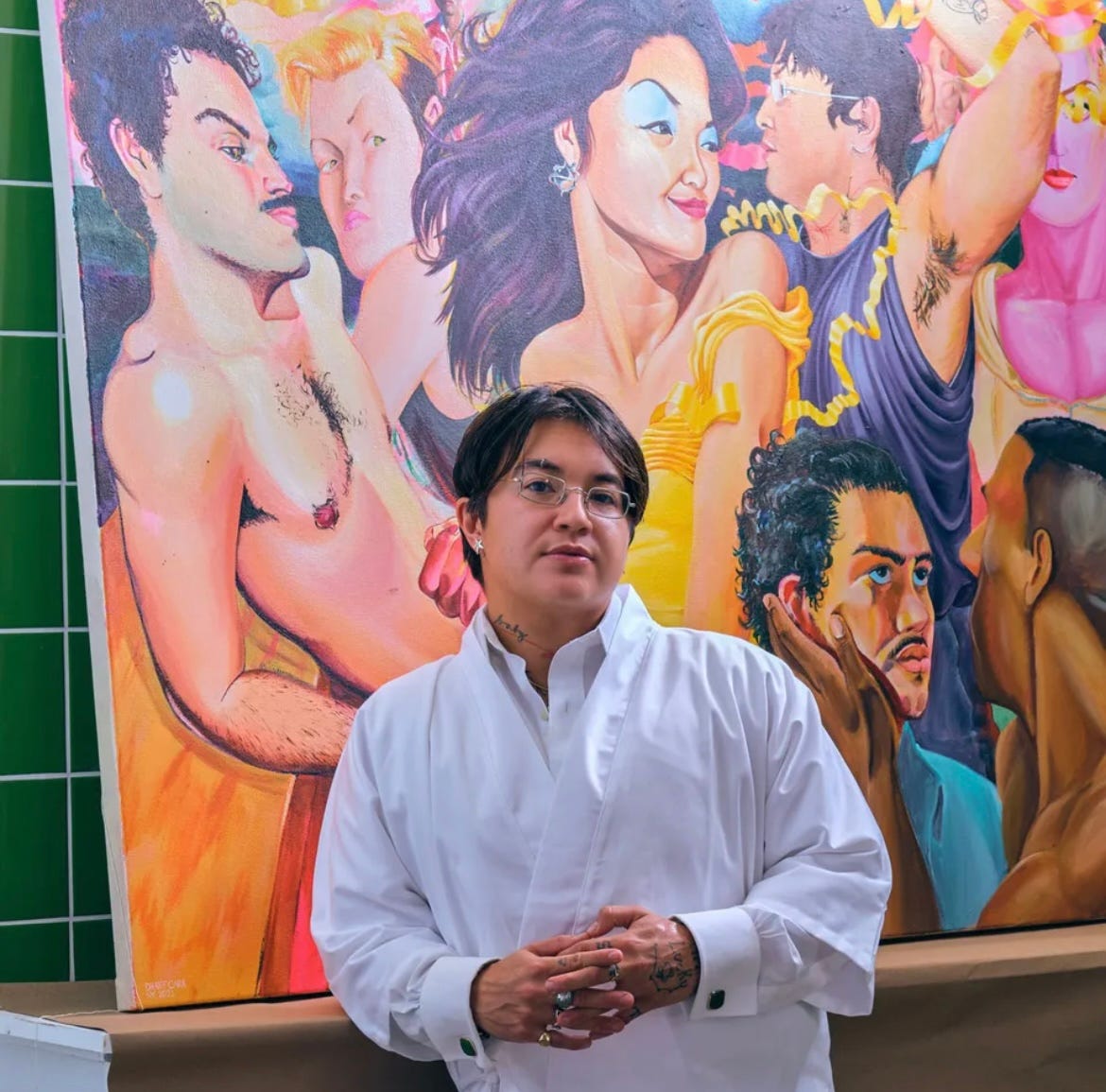Global Roundup: South Africa Women’s Rights Groups vs Police, Abortion Decriminalized in Mexico State, Azerbaijan Queer Media, US Banned LGBTQ Book, Trans Filipinx Chef
Curated by FG Contributor Samiha Hossain
Women protesting outside court in Krugersdorp, west of Johannesburg, in August, before charges were withdrawn. Photograph: Siphiwe Sibeko/Reuters via The Guardian
CW: sexual violence
The men, believed to be illegal miners, were arrested during a police raid at the mine after at least eight women were attacked and raped while filming a music video in July.
Reports of the rapes sparked protests in townships around Krugersdorp as community members accused the small-scale miners working in the abandoned mine shafts of the crimes. The protesters descended on the abandoned mines, blocking the holes the miners used to go underground and burning their makeshift tents and belongings. Miners were apprehended, assaulted and handed to the police.
However, the rape and robbery charges were withdrawn because state prosecutors said there was insufficient evidence against the men to proceed with the case. The 14 men are now facing only immigration charges as they are suspected to be in South Africa illegally.
The Commission for Gender Equality called on police to quickly relaunch an investigation. The Sisonke organisation, which staged demonstrations at court during the suspects’ appearances, also called on police to find those responsible.
We are completely outraged at these latest developments, which means the police have no idea who committed this crime. They arrested the wrong people, so the real criminals are still out there. -Javu Baloyi, spokesperson for The Commission for Gender Equality
File: Paola Garcia/Reuters] via Al Jazeera
The Mexican state of Quintana Roo has voted to decriminalize abortion, becoming the latest area to ease restrictions on the procedure as part of a “green wave” demanding greater reproductive rights across Latin America. Nineteen lawmakers on Wednesday voted in favour with three against, approving a change in the law that would decriminalize abortion for women up to 12 weeks pregnant and remove a requirement for rape victims to report their abuser to access abortion.
The struggle is bearing fruit. We will insist that abortion is not only legal, but also free and safe. -Quintana Roo Feminist Network
Abortions became legal in Mexico City 15 years ago, and last year the country’s Supreme Court unanimously ruled that penalizing abortion was unconstitutional. While rights activists have campaigned to remove state sanctions to ensure women can freely access abortions, fewer than a dozen of Mexico’s 32 states have since adapted their laws.
The push across the region comes as the US has gone in the opposite direction after the US Supreme Court in June overturned its landmark Roe v Wade abortion ruling. Latin American activists have said they remain undeterred by the US abortion rights rollback, with some even pledging to help women in the US access abortion and other reproductive healthcare services.
The inscription on the monitor: “This page no longer exists”. Illustrator: Aydan Hasanova via JAM News
JAM News discuss how queer people in Azerbaijan have created various media and platforms for the purpose of self-expression. However, many of these projects have suspended their activities due to material or psychological reasons. Others, although at times with interruptions, have kept going, but do not feel confident about the future.
Transvisionary was a queer project created by Vusala Hajiyeva in 2021. It is an audio-visual platform covering transgender issues. The platform covered topics such as “What is misgendering?” and “What to do before hormone replacement therapy for the benefit of the body?”
There was not a single base for transes to get information. For example, who transgender people are, how to start the transition, etc. Our goal was to have at least some information base for these people. -Vusala Hajiyeva
Transvisionary suspended its activities in March 2022 due to financial problems. Hajiyeva said she did 80% of the work on the project herself. She cannot afford to devote most of her time to volunteer work.
The violation of the rights of LGBTQİ+ and the lack of a mechanism for their protection in Azerbaijan is reflected in reports of local and international organizations. In the rating of “Reporters Without Borders” for the current year on the index of press freedom, Azerbaijan ranked 154th among 180 countries.
In 2021, LGBTQi+ activist Ali Melikov created the Qıy Vaar platform, where podcasts are being prepared under the slogan “LGBTQİ + creates content and wants to give you a platform to speak.” Melikov and feminist Sanay Yaghmur also created a platform called Femkulis in 2020. It is focused on education on feminism and publication of facts of unfair treatment of women and LGBTQİ+ people.
According to gender researcher Leyla Hasanova, it is very important to have queer platforms that cover and document crimes and facts of violence against queer people and violations of their political and civil rights.
Traditional media and the current political regime distort queer realities. And such platforms are limited resources for getting real information about them. -Leyla Hasanova
George M. Johnson's young-adult memoir All Boys Aren't Blue has become one of the most banned books in the U.S. and they worry about schools censoring works like theirs.
All Boys Aren't Blue is about growing up Black and queer, and always feeling different but not having the words to express it. Over the past couple of years, at least 29 school districts have banned the book because of its LGBTQ content and for being sexually explicit.
The curriculum that is being taught in most school systems is still heavily geared towards the straight, white, male teen. And so when we now have the ability to put books into curriculum that tell other stories, that tell stories that are non-white, that tell stories that are non-heterosexual, they're trying to take them out across the board because, you know, it's like, 'Oh, my God, how dangerous would it be if young white teens had to actually learn about the other people who exist in society with them?' -George M. Johnson
Johnson is glad to have written a book that might help others, but says watching it be banned has been bittersweet. They say that if parents do not want their own child to read it, they should opt them out rather than try to block all students — some who may really need the book — from accessing it.
Students ... have publicly said on record that works like mine have saved their lives, works like mine have helped them name their abusers, works like mine have helped them come to terms with who they are and feel validated in the fact that there is somebody else that exists in the world like them. -George M. Johnson
While the book has its vocal critics, Johnson says they are far outweighed by its supporters, whom they have heard from at school board meetings and in written letters and recreated cover artwork. Ultimately their writing is an extension of the advocacy work they have been doing for years.
So the book ... is so much bigger than just my story. And I'm watching it in real time help so many people, from parents to children to teachers to librarians, across the board. I just feel like the support is greater, and we just have to find ways to make sure that everybody sees that, too. -George M. Johnson
Photo by Johnny Autry via them.us
Chef Silver Iocovozzi is the owner and chef of Neng Jr.’s in the US – the first Filipinx restaurant in Asheville, North Carolina. Since opening this summer, the eatery has attracted a devoted following, many of whom travel exclusively to eat Iocovozzi’s unique combination of local ingredients and Filipinx recipes.
So many people have been like, ‘We’re just here for the day.’ And it’s almost always Filipinos. It’s the best-case scenario. I’ve never seen this kind of representation of myself in a restaurant. -Silver Iocovozzi
As exciting as it is to serve a steady flow of queer diners, Filipinos, and the intersections of the two, Iocovozzi maintains that a lot of their work involves protecting their staff from the abusive environments so typical of the culinary world while defending their cuisine from the reductive expectations of ignorant guests.
A lot of it boils down to white supremacy and the assumptions white people have about this restaurant, [which is that it will be] cheap and will serve the same exact Filipino food they’ve had at their one friend’s house. -Silver Iocovozzi
In an interview with Them, Iocovozzi talks about how they think transgender chefs are better chefs than cisgender chefs due to the process trans people go through in order to find themselves.
In order to find yourself as trans, there is a specific attention to detail to yourself and how you see yourself in the world. Being attentive to detail has to start with actualizing yourself and what you need, which creates a confidence I don’t see in a lot of cis people. It’s that experience of not playing around, of being like I’m not who you think I am until you realize who you are, and then you’re like I am who I say I am. And If you don’t want to fuckin’ address me correctly, that’s on you. That’s how I feel about the restaurant: It is what I say it is. -Silver Iocovozzi
Samiha Hossain (she/her) is a student at the University of Ottawa. She has experience working with survivors of sexual violence in her community, as well as conducting research on gender-based violence. A lot of her time is spent learning about and critically engaging with intersectional feminism, transformative justice and disability justice.
Samiha firmly believes in the power of connecting with people and listening to their stories to create solidarity and heal as a community. She refuses to let anyone thwart her imagination when it comes to envisioning a radically different future full of care webs, nurturance and collective liberation.








